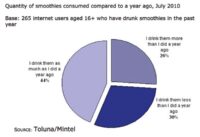 The smoothies category has seen its exponential growth – driven by the success of Innocent – checked in the past three years, with the economic downturn seeing many consumers switching to cheaper alternatives such as pure fruit juices.
The smoothies category has seen its exponential growth – driven by the success of Innocent – checked in the past three years, with the economic downturn seeing many consumers switching to cheaper alternatives such as pure fruit juices.
But having seen exponential growth of 159% in volume sales between 2005 and 2007, the smoothies market then saw a dramatic reversal in fortunes with a 36% decline between 2007 and 2009 as consumer spend became increasingly squeezed.
Indeed, the category has suffered from being perceived as disposable rather than an essential as well as adverse publicity about whether it is as healthy as people initially thought.
Mintel forecasts that this decline will slow in 2010 and the market will experience slow but steady growth thereafter, however, not to the extent seen in the mid-2000s where Innocent almost single-handedly grew the category from scratch.
The category is showing tentative signs of recovery and Mintel forecasts that a continued upturn in the economy, as well as smoothies’ increased presence in the children’s market, will see the category return to growth in the near future. However, to what extent this is so depends on dealing with consumer mistrust that smoothies are not as healthy as they claim to be.
That smoothies are drunk by only a quarter of the UK population is mainly as a result of being a very new soft drinks category, meaning that targeting more change-resistant over-45s is much more difficult – and less likely achieve a return on investment.
However, smoothies have a high usage among under-45s and when these individuals become older the penetration of UK smoothie drinkers is likely to rise considerably, particularly as the elderly tend to be more health-conscious.
Smoothie brands are increasingly targeting kids as well as adults, their major selling point being it makes parents’ lives easier by persuading otherwise reluctant kids to consume fruit on a daily basis. Analysis shows that uptake of kids drinking smoothies is much higher when they are younger (pre-secondary school) and parents have more control over the content of their lunches.
Price point is hindering many brands – the dominant brand in the market – from increasing its uptake in the impulse market, a potentially profitable area. Analysis shows that its 250ml bottles are simply too expensive compared to the competition.
The convenience of smoothies in contributing towards people’s five-a-day is considered a huge benefit by consumers and this has been a focal point for Innocent’s recent communications.
However, smoothie drinkers are equally enthusiastic about something less widely publicised – the exciting flavours of smoothies.
The interest in flavours serves a dual purpose: the combination of exotic fruits make them seem both more interesting and ideal for providing added health benefits due to the variety of nutrients, particularly when superfruits are thrown into the mix.




Comments are closed.